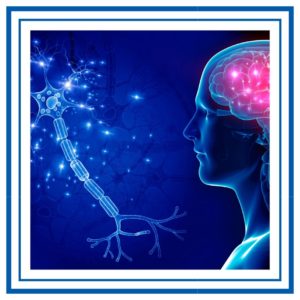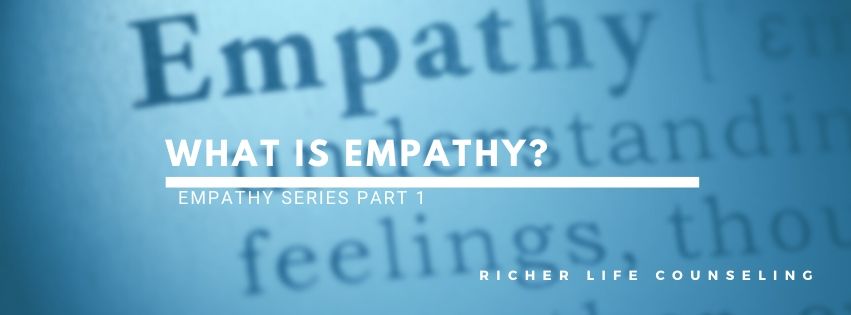Empathy Series Part 1
What is Empathy?
This one skill, when mastered, can be like winning the lottery. Research has shown that when you can have high levels of empathy, you will be more successful in work, friends, partnering, and in romantic relationships. While any relationship book you might read will talk about empathy, for some of us, we just don’t get it. In this blog series, I will answer the following questions” what empathy is and why is it important? I’ll answer: where does empathy come from, what are the different types of empathy, and lastly how to develop empathy.
Some Definitions of Empathy

- Empathy n. the power of entering into another’s personality and imaginatively experiencing his experiences. ~~ Chambers English Dictionary, 1989 edition
- “[Empathy is] awareness of others’ feelings, needs, and concerns.” ~~ Daniel Goleman, in Working with Emotional Intelligence
- “I call him religious who understands the suffering of others.” ~~ Mahatma Gandhi
- “Empathy is intuitive, but is also something you can work on, intellectually.” ~~ Tim Minchin
Empathy is an action that drives a deeper connection with others. When you can be empathic, you can share emotional space with someone else. Empathy is about putting your emotions aside for the moment and “feeling” what someone else is feeling.
Where does empathy come from?
Think of empathy as a wifi connection to other people’s feelings around us. It is a way for us to connect and be close. This is due to a part of the brain called mirror neurons. Mirror neurons reflect back action that we observe in others, causing our brains to mimic that action in our own brain. This is why when you see someone get hit in the stomach with a baseball bat, you grab your own stomach. In that moment, our brains are actually processing the same type of response that we see. As we talk about the brain, I am simplifying very complex neuroscience to help you understand empathy. Just try to keep in mind that our brain is very complex.
Mirror Neurons
Mirror neurons were discovered in the early ’90s in monkeys. What reachers have concluded is that mirror neurons help us decode (receive and interpret facial expressions). When we see someone making expressions the same region of our brain becomes activated. The better we are at interpreting the facial expression, the more active our mirror neurons.

That last section is important because it shows that we can train ourselves to develop this skill. Some of us have a natural ability to understand other people’s emotions. This is one reason why when people have experienced abuse and trauma growing up, they tend to be more aware of other people’s feelings. They had to develop a spider-sense when they were young to navigate abuse. They could think to themselves that if dad looked angry, you should not be around them.
The Right Supramarginal Gyrus
This area of the brain helps us distinguish our emotional state from others. It is believed that this part of the brain is responsible for empathy and compassion. When we have to make a quick decision, our ability to be empathic is dramatically reduced.
QUICK DECISION = LOWER EMPATHY
When we are emotional stress, in an uncomfortable situation, this will affect this part of the brain. That means that it will affect your ability to display any type of empathy. This is why healing from hurts within a relationship is so hard. When in an argument, you are experiencing several emotions, and showing up and being empathic to your partner, you have to learn to understand what you are feeling first.
Why is Empathy important?
Daniel Goleman, an emotional intelligence researcher, has founds that empathy is a core component of emotional intelligence and is a powerful predictor of success in many professions. Empathy helps us develop more profound levels of trust and connection.
If you are struggling with your marriage, one reason might be is that one of you is not empathic. Empathy isn’t a building block. It is the mortar that holds the relationship together.
Before Empathy Understand Your Emotions
By now, you should understand what empathy is, why its important, and where it comes from. Before we move to part 2 of how to develop empathy, you need to ask yourself how good am I at being aware of my own emotions? You can read articles on emotion so you can understand your primary and secondary emotions. Other ways to develop a better understanding of your emotions is to set a timer to go over a few times a day, and when it does, ask yourself what I am feeling right now. This helps you get more intuit with what you are feeling.
Watch some tv shows and movies. Ask yourself, what does it make you feel? If you watch the first part of Disney Pixar’s UP, what emotions wash over you. Don’t worry about understand why you feel the way you feel. Just focus on what you are feeling.
The last exercise you can do to improve your emotional awareness is to start to practice guide mediation. This can help you learn to stay present and have a deeper emotional awareness of yourself.
Check Out Part 2 of our Empathy Series
At Richer Life Counseling we specialize in working with all types of counseling, and all types of relationship problems. Check out our articles on relationships here.
If you are noticing that you don’t understand your own emotional expense, and you don’t have empathy. We can help with that tat Richer Life Counseling. From individual work to couples’ work, you can contact us today to start to understand yourself and improve your relationships.
Contact us today by calling or texting 702-518-1546, email, or booking a session by hitting the appointment request button. We can normally get you into a session within 24 or 48 hours.
We offer both online therapy (learn more about online therapy here) and in-person therapy at our Las Vegas office. Our office is located in West Las Vegas right off the 95 & Rainbow. Our address is 222 S. Rainbow Boulevard | Suites 113-114 |Las Vegas NV 89145
- Table Topics - June 25, 2020
- How to Apologize - June 11, 2020
- What is stonewalling? |TheRicher Marriage Show - June 5, 2020

